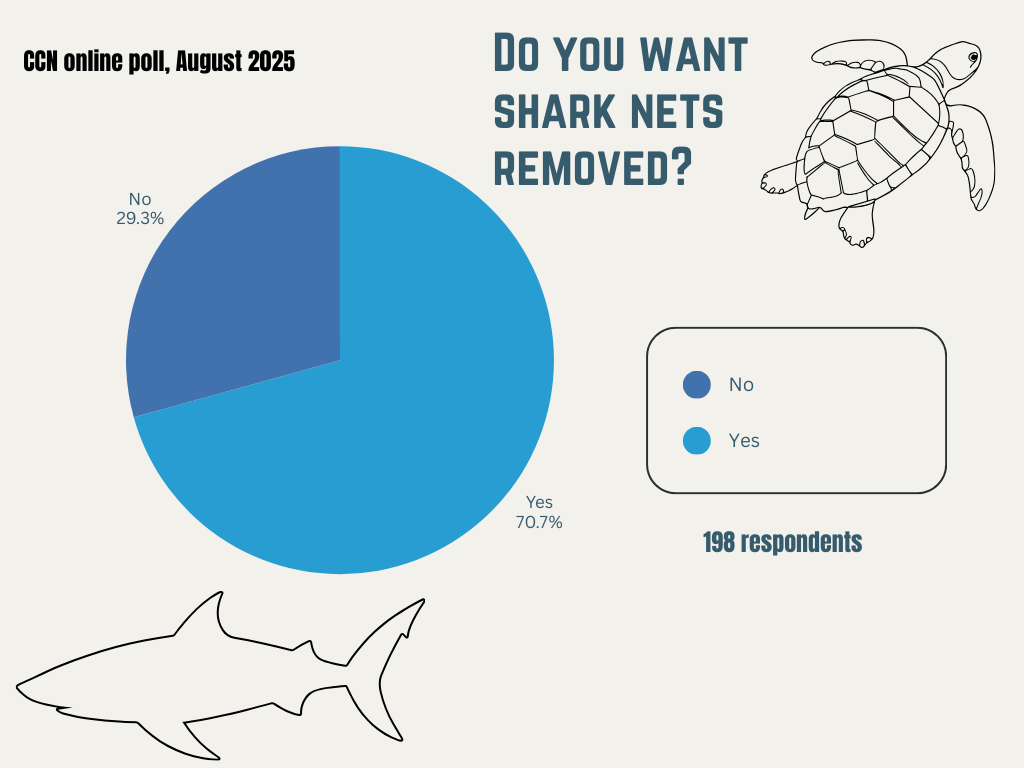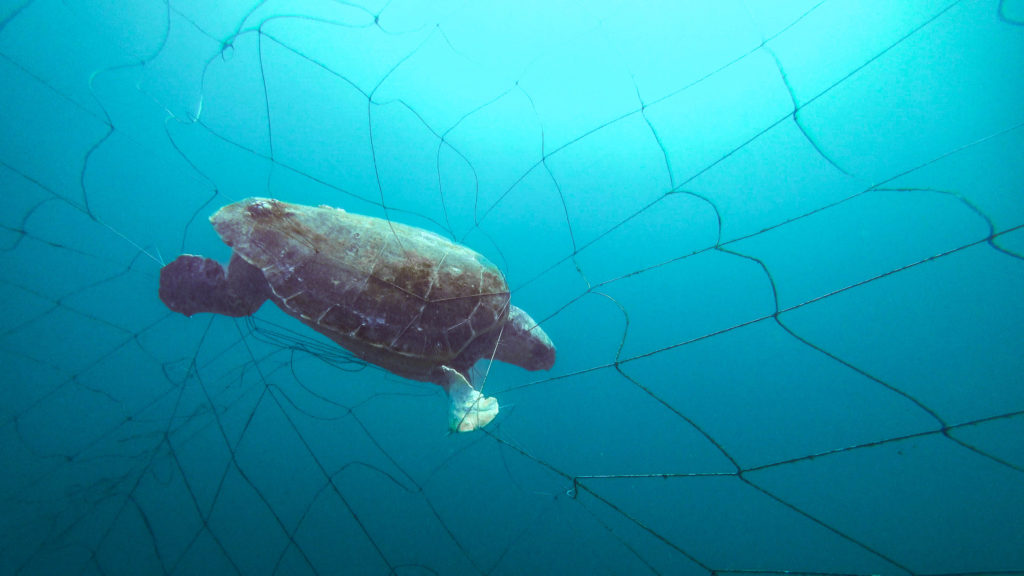Shark nets were set to be installed at the region’s beaches this week, despite no decision having yet been reached on a Central Coast location for the State Government’s trial net removal.
A Central Coast Council spokesperson confirmed Council understood the NSW Government would install the nets from September 1, with the next steps of the proposed trial net removal to be advised following formal responses from the three councils involved to the appropriate Minister.
Enmeshed in the shark mitigation debate is a fundamental misconception about how shark nets are used in beach safety, along with a long political history.
In 2024, the NSW Government asked councils to provide feedback on shark net use and selected three local government areas (LGAs) for a trial removal ahead of this Summer season, inviting Central Coast Council to participate.
At its meeting on Tuesday, August 26, Council voted unanimously to join the trial.
Based on the final Motion passed, beach selection for shark programs will be referred to the Department of Primary Industries (DPI), and new technologies must be in place before nets are removed.
Shark Defence Co-ordinator for Sea Shepherd Jonathan Clark said it was unreasonable for the DPI to have initially put the decision on councils.
“What we’re seeing is Council saying please give us more drones, and whilst I understand the call, I’m cautious of holding out for replacement technologies when the issue is removing the nets,” he said.
Shark nets are devices used to capture large sharks, aiming to reduce their numbers and, presumably, the possibility of shark bites.
At harbour beaches, nets cover the entire swimming area, providing a barrier.
At ocean beaches, the barrier is illusory as nets stretch approximately 150m, while beaches run hundreds of metres or kilometres.
Target species – White, Bull and Tiger Sharks – make up only about 10% of catches.
The rest include dolphins, turtles, rays and whales.
Fuelling the scientific argument that nets provide only an illusion of safety, nets are also deployed seasonally, not year-round, but they are relatively low in cost.
Marine Mammal Specialist Ronnie Ling of Marine Wildlife Rescue Central Coast (MWRCC) highlighted the contradiction.
“If fishermen were to catch a white shark, they would be fined or possibly jailed,” he said.
“I can’t get over the hypocrisy of calling a species protected yet deploying devices aimed to trap and kill them.”
Ling, and the founder of MWRCC Cathy Gilmore, have opposed nets for more than a decade through advocacy and rallies.
“It has taken a long time for the movement to have this momentum,” Ling said.
Izabela Sajdok, spokesperson for Terrigal-based Friends of Kurrawyba, which launched a petition in 2024 calling for the permanent removal of nets across NSW, said it was hard to imagine the destruction of marine life in the nets unless you saw it.
As a diver, she has witnessed the damage firsthand, noting that even freed animals mostly don’t survive.
Humane Society International Australia spokesperson Lawrence Chlebeck told the Council meeting that the nets effectively rang a “dinner bell” for sharks closer to shore.
The Shark Meshing Program began at Sydney’s beaches in 1937 and was extended to the Central Coast in 1987.
Following a spike in shark bites, including several fatalities in 2013–15, the then NSW Government commissioned a review and held a shark summit, resulting in the NSW Shark Management Strategy 2015–2020, focused on non-lethal measures.
“The safety of beachgoers is the NSW Government’s number one priority,” a spokesperson for the current NSW Government said.
“The NSW Government’s $21.5M annual shark management program is the most comprehensive and largest of its kind in the world, using a range of leading technologies, community tools and campaigns.”
The Central Coast region currently uses eleven shark nets, drone surveillance to scan coastal waters for sharks, listening stations that detect tagged sharks and alert beachgoers, and 32 SMART drumlines that intercept target sharks beyond the surf break, for release further out.
The nets are not popular with Central Coast locals either.
An online poll was conducted by Coast Community News in August this year to gauge support for the removal or otherwise of the nets.
The results showed an overwhelming majority of the 198 respondents supported the full removal of nets across the region, with just over 70% voting to get rid of them.

A 2024 scientific paper co-authored by Dr Natalie Moltschaniwskyj, now DPI Chief Scientist, found no statistical difference in shark interactions over 22 years between netted and non-netted beaches.
This research underpins the NSW Shark Smart program.
These experts say that reducing shark bites requires a mix of strategies and greater awareness from beachgoers across all activities and conditions.
About half of the bites now involve surfers, often at times or locations where measures are absent.
Personal deterrent devices are considered most suitable for this purpose.
Member for Gosford Liesl Tesch said she had long advocated for the extension of innovative technologies such as SMART drumlines to Central Coast beaches such as Umina Beach.
She confirmed DPI would consider the Council’s response.
Member for The Entrance David Mehan said the government was “carefully and deliberately moving towards a position where we can start to remove shark nets across the NSW coastline, including on the Central Coast”.
“We are not there yet, but we will continue in that direction,” he said.

But Member for Terrigal Adam Crouch said he was disappointed with how the issue had been handled, saying that a trial should have already gone ahead.
“When you’re in government, you can do a lot of things, and when you’re in opposition, all you can do is advocate,” he said.
Known as an outspoken voice on the topic, he noted that advocacy is easier when community support is strong.
Originally from South Australia, which does not use shark nets, he described the nets as nonsensical and the bycatch issue as confronting.
He referred to major funding in technology by the former government.
“Frustratingly, with the change of government in 2023, the trial went on the back burner and nothing has happened until now,” he said.
Ling said we were seeing successive governments
“too gutless to put their foot down and remove the nets”.
Ronny Ling
Marine Science Educator Sam Oxenford of the Marine Discovery Centre questioned the value of the trial.
“Given how rare shark-human interactions are, running a trial across just three beaches over a single Summer won’t produce findings of statistical significance,” he said, pointing to existing evidence of nets’ ineffectiveness.
Jonathan Clark said politicians should not be fearful of making the decision.
“They will have the backing of Sea Shepherd and all the other organisations that have been advocating for this for a long time,” he said.
On the Central Coast, groups that have called for the removal of shark nets in favour of non-lethal technologies include: Council, Friends of Kurrawyba, Community Environment Network, Humane Society International Australia, Marine Wildlife Rescue Central Coast, the Nets Out Now Coalition and Terrigal Ocean Swimmers.
The Central Coast Council and wider community now await DPI’s response.
A request for comment from Dr Moltschaniwskyj regarding the research was unsuccessful.
Ivona Rose




Be the first to comment on "Shark net debate continues to enmesh the Coast"